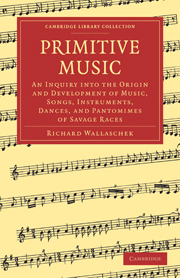 Primitive Music
Primitive Music Book contents
- Frontmatter
- PREFACE
- Contents
- CHAPTER I GENERAL CHARACTER OF THE MUSIC OF PRIMITIVE PEOPLE
- CHAPTER II SINGERS AND COMPOSERS IN PRIMITIVE TIMES
- CHAPTER III INSTRUMENTS
- CHAPTER IV THE BASIS OF OUR MUSICAL SYSTEM
- CHAPTER V PHYSICAL AND PSYCHICAL INFLUENCE OF MUSIC
- CHAPTER VI TEXT AND MUSIC
- CHAPTER VII DANCE AND MUSIC
- CHAPTER VIII PRIMITIVE DRAMA AND PANTOMIME
- CHAPTER IX ORIGIN OF MUSIC
- CHAPTER X HEREDITY AND DEVELOPMENT
- Summary
- List of quoted Authorities
- Index
- Plate section
CHAPTER II - SINGERS AND COMPOSERS IN PRIMITIVE TIMES
Published online by Cambridge University Press: 29 August 2010
- Frontmatter
- PREFACE
- Contents
- CHAPTER I GENERAL CHARACTER OF THE MUSIC OF PRIMITIVE PEOPLE
- CHAPTER II SINGERS AND COMPOSERS IN PRIMITIVE TIMES
- CHAPTER III INSTRUMENTS
- CHAPTER IV THE BASIS OF OUR MUSICAL SYSTEM
- CHAPTER V PHYSICAL AND PSYCHICAL INFLUENCE OF MUSIC
- CHAPTER VI TEXT AND MUSIC
- CHAPTER VII DANCE AND MUSIC
- CHAPTER VIII PRIMITIVE DRAMA AND PANTOMIME
- CHAPTER IX ORIGIN OF MUSIC
- CHAPTER X HEREDITY AND DEVELOPMENT
- Summary
- List of quoted Authorities
- Index
- Plate section
Summary
Over almost the entire African Continent we find a sort of wandering minstrel, a person whose vocation is the glorification of the mighty chief in whose service he may be, and to demonstrate for the spreading of his fame the inexhaustible power and beauty of art. This is remarkable, as art, or at any rate music, is a popular festival in which every one takes part, not merely as one of the audience but as a performer. So it cannot be said that art is indebted to these professional artists for its origin, and they, for their posts, to the graciousness and munificence of the chief. On the contrary, what is achieved in this way is throughout a lower kind of art, and, it appears to me, a product of later—although still a very primitive—state of culture.
These singers are, in Africa, a sort of sycophants. Each chief keeps two or three of them who have to accompany strangers by way of state, and to sing songs in praise of the white man and of the king. It is, too, their duty to praise the “wit and genius” of any great man into whose service they may for a short time be taken. If the expected presents are not given they go to the villages round about and retract all that they have previously said in praise of their “protectors”. They are renowned for their great wealth,and their wives possess more “blue-stones and crystals than does the chief's wife”.
- Type
- Chapter
- Information
- Primitive MusicAn Inquiry into the Origin and Development of Music, Songs, Instruments, Dances, and Pantomimes of Savage Races, pp. 66 - 79Publisher: Cambridge University PressPrint publication year: 2009First published in: 1893
